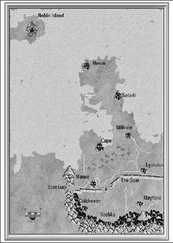Ezra took hold of her thin arm and tried to take her to her room. Noga wouldn't let him. She fought back. She stood rooted to the spot. Ezra didn't want to take her to her room by force. Perplexed, he paused and looked at her, desperately tired. The night air was still thick and oppressive. In the distance dogs howled wildly, and the jackals howled in answer. The night was full of dim anger. Trembling all over, Noga clung to the man's powerful body. He tried to prize her loose. She gripped his clothes with her nails. Delicious kisses on his hairy, sweat-matted chest. Backward she dragged him step by tiny step into the thick darkness of the myrtle bushes. Who taught her tongue to lick his salty neck so tenderly? Or her fingers to play so cleverly on the back of his head? Overcome, he fell, his heavy hands on her shoulders. His voice betrayed him, no longer forming words, only dry groans. Noga was terrified. She regretted it now and tried to escape. His grip was heavy, frightening. Her eyes flickered and went out. Her body awoke and filled with sweet gushes. Warm shudders flowed from one sweet part of her to another. Her breath came in pants, her mouth stretched wide open, her tiny teeth dug again and again into the blind flesh. The ground beneath her stirred, sending quivering ripples through her. On spreading ripples her body floated. Torrents flooded over her, bursting out strong and cruel from forgotten lairs. Wave after wave after wave. The confusion whirled in a cycle, in a burning rhythm. Boiling water battered her body. Boiling oil. Burning poison. Sweet seething poison slicing down into the marrow of her bones. An imprisoned scream, flash after flash swept away into the water, the waves were not black, they were gleaming, dazzling flares capering in the water, a streaming jet swept her sick body toward roaring waterfalls.
Two or three hours later. Dawn light outlining the slats of the shutters. She turns between her sheets. Strange, secret sensations. Her body curls up compulsively, her knees drawn up to her chin, pressing against her breasts, her fingers caressing her skin. Drop by drop, like rain in a gutter, a song dripped inside her:
From the Dead Sea to Jericho
The pomegranate sweetly smells,
A pair of eyes, a pair of doves,
And a voice like the sound of bells.
She can hear them in her skin. She can hear the bells.
For six more days the hamsin oppressed us relentlessly. If you reached out to touch a bench, a wall, an irrigation tap, a stair rail, the inanimate object responded with incandescent hatred. Reuven Harish found relief from the oppression — incredible though it may seem — by casting it in a poetic mold.
Blazing heat, down you beat
On scorpion's lair and snake's retreat.
Leaving your arid desert seat,
The home of Genie and Afrit,
You stamp the plains with scorching feet,
Stifling everything you meet.
Panting souls find no retreat,
Strongest men admit defeat;
Gasping voices beg, entreat
Relief from yellow, parching heat.
Meanwhile, the enemy's provocations intensified. Frequent shots were fired into our fields, by day as well as by night. There were no casualties, however. The enemy were careful not to overstep the mark. They were content to harass us, and remind us that they were there, bent on our destruction.
At the end of the week a small army unit dug itself in the vineyards and pointed machine guns at the enemy positions installed halfway up the slope, on the territory that was the bloodstained subject of dispute between the two states. Our troops had orders not to provoke the enemy. If the enemy launched a serious action, if a stray tractor was cut off by firing, they were to cover it and extricate it. But they were forbidden to return random fire, so as not to aggravate the prevailing tension. They also had orders to dig some trenches, so that people working in outlying fields could take cover if attacked. Digging trenches during the stifling hamsin, even at night, is not the most pleasant of tasks. Our soldiers found assistance from an unexpected quarter: Oren Geva and his friends appeared one afternoon to offer their help. Before the commanding officer had managed to dismiss the intruders with a reprimand, they had already dug two or three magnificent trenches. The officer shrugged his shoulders and showed them where and how.
This new problem provoked conflicting opinions among the schoolteachers on the kibbutz. According to Herbert Segal, in addition to the obvious danger to which our children were exposed, it would also encourage militaristic attitudes. It was the forceful opinion of Reuven Harish, curiously, that swayed the balance. In the first place, he said, who could stop them. Second, it would provide a constructive outlet for their excess energies.
For several days the lads threw themselves into their work with a will. They worked well, and they were handsomely rewarded: a pat on the back from the commanding officer for Oren Geva, the satisfaction of being in the front lines, some rich additions to their vocabulary, the privilege of secretly handling the gleaming weapons, and even — pray that no word of it reaches hostile ears — unofficial permission to clean and oil a submachine gun.
In the dining hall after supper small groups gather to discuss the situation. Some decipher and interpret the signs; others hold that the enemy is simply out to demonstrate his presence; others maintain that we are witnessing the prelude to a big show, such as we saw three months ago, when they began by ambushing a tractor and ended up battering a kibbutz with heavy gunfire.
The other topic of conversation is the question of reprisals. Most of the older members think that it would be better for us not to heap coals on the fire. So long as the enemy refrains from launching a real attack, argues Mundek Zohar, head of the regional council, we are better off showing our contempt by maintaining a dignified silence. Podolski looks up from the work rotas to agree with Mundek Zohar and adds that we mustn't allow ourselves to play into their hands by doing what they want us to do.
The youngsters think differently, as is only natural. Tomer Geva lays a large hand on Podolski's lean shoulder and says: Podolski, Podolski, I'm very sad to have to inform you that the dear Arabs haven't read Tolstoy or Rosa Luxemburg, and I'm afraid they're not too well up in Mahatma Gandhi, either. But there's one language they're perfectly at home in. Without a crushing blow, a really juicy blow, as they say, we'll never stop the bastards and their blasted nuisance.
Grisha Isarov, though not a young man, has a youthful temperament. He endorses Tomer's sentiments and remarks: Prevention is better than cure, Mundek, and your fine ideas can cost lives. As for you, Podolski, you've nothing to fear. They're brave when they scent weakness and cowards when you show them a fist. I've known them for thirty years now. They haven't changed and they'll never change. Once, in '46, I went out to set an ambush for a gang of them. Not an ordinary ambush, though…
Meanwhile, the military authorities maintained a total silence. One Friday evening we had a visit from a group of high-ranking officers. We received them in the dining hall with cold drinks and fruit. They answered all our questions with a smile and a shake of the head. Afterward, they strolled around outside for twenty minutes, exchanging a few words in an undertone, while an undersized captain ran around energetically rolling and unrolling maps for them. At the same time, he made signs to the curious youngsters to keep their distance. Gai Harish's young gang observed the visitors from a respectful distance, their mouths agape, the heads cocked, their fair hair falling over their foreheads, and wonder blazing in their eyes.
Читать дальше












